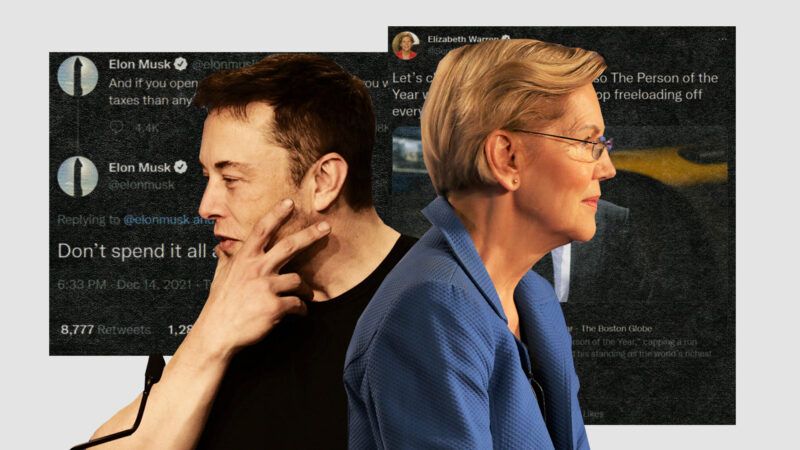Elizabeth Warren Told Elon Musk To 'Actually Pay Taxes' and 'Stop Freeloading Off Everyone Else'
Musk responded that he will pay more in taxes this year than any other American in history.

Tesla CEO and world's richest person Elon Musk, who has an estimated net worth of $251 billion, was denounced yesterday by Sen. Elizabeth Warren (D–Mass.), who has long been in showy pursuit of getting millionaires and billionaires to pay their "fair share."
Time had just named Musk its Person of the Year, so Warren tweeted: "Let's change the rigged tax code so The Person of the Year will actually pay taxes and stop freeloading off everyone else." Musk tried a few different responses on for size, including "You remind me of when I was a kid and my friend's angry Mom would just randomly yell at everyone for no reason," "Please don't call the manager on me, Senator Karen," and then "Don't spend it all at once … oh wait you did already."
And if you opened your eyes for 2 seconds, you would realize I will pay more taxes than any American in history this year
— Elon Musk (@elonmusk) December 14, 2021
Musk's best response was to counter the claim that he won't pay taxes this year—a common talking point from those who won't acknowledge that many ultra-rich founders and CEOs accrue such high net worths not via traditional salaries alone (or in some cases at all) but via a mix of stock options, capital gains, interests, dividends, and business income. Though Musk did not pay federal income taxes back in 2018 (because he took out loans against Tesla shares), he will be on the hook to pay an extreme amount this year: potentially between $9 billion and $10 billion, if he exercises soon-to-expire stock options.
The Wall Street Journal reports that Musk
faces an August deadline to convert roughly 22.9 million vested stock options into shares or let them expire worthless, according to a regulatory filing. He would need about $143 million to exercise those options, and could owe more than $9 billion in federal income and Medicare taxes upon exercising them.
Under California law, Mr. Musk also likely would face a sizable state tax burden because exercised options are treated as compensation partly earned in the state while he lived there.
Though outlets like ProPublica engage in a fair bit of finger-wagging on the matter, many of the ways ultra-rich people avoid paying extremely high tax bills are perfectly legal. And many uber-wealthy people, armed with financial advisers, do all kinds of things that "working rich" and upper-middle-class people don't: They use low-interest loans backed by their portfolios to borrow money to live on; they decide when to sell stocks based off how much they'll be dinged by capital gains taxes; they find all kinds of assets where they can park their wealth or transfer it from generation to generation without having to give a huge cut to the federal government.
While Warren was hectoring Musk for failing to "actually pay taxes," 61 percent of Americans (roughly 100 million households) actually, for real, didn't pay federal income taxes last year. Now, last year was a bit anomalous due to high unemployment and the stimulus checks, but the number typically hovers somewhere between 40 and 47 percent, comprised by people who make low incomes, take advantage of child-related tax credits, or are elderly. And roughly 20 percent of Americans end up paying neither federal income tax nor payroll taxes.
The Tax Foundation noted that in 2018, the top 25 percent of taxpayers paid 87 percent of total federal income taxes. The top 1 percent pony up roughly 40 percent of total federal income taxes. Warren's spending priorities are largely bankrolled by the richest people in America—to the extent that they're bankrolled at all, as opposed to being added to the exorbitant national debt. Part of her critique is fair: Musk's use of government subsidies does constitute freeloading off the American taxpayers. But the rest is somewhere between misleading and dishonest.
"The government is inherently not a good steward of capital," Musk told Time for its Person of the Year profile. Regrettably, Musk will likely be forking over a handsome sum this year to the very people he has correctly identified as people unlikely to spend it well.


Show Comments (216)